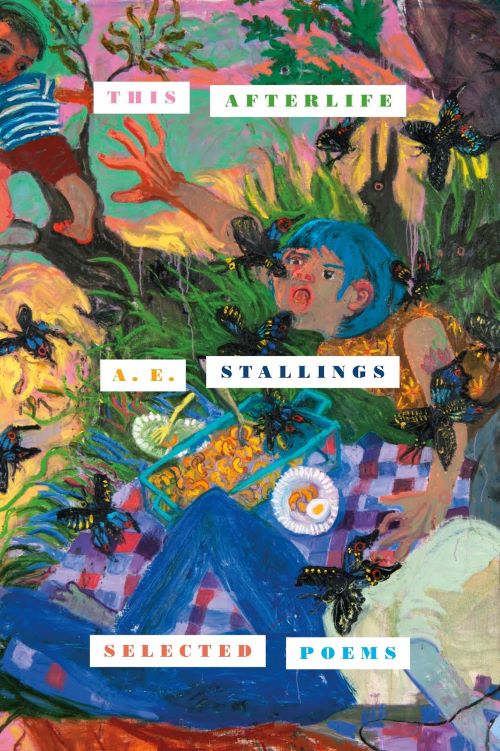OLIVESIs loveso evil?Is Eve? Lo,love vies,evolves. Ilose selves,sylphs ofloose Levi’s,sieve oil ofvile sloe.Love sighs,slives. Oveils ofvoile, sosly, so suave.O lives,soil sleeves,I love soI solve. Upon a Line of Foreign VerseFROM THE GREEK OF GEORGE SEFERISto Elli, Christmas 1931Happy is he who has made the journey of Odysseus. Happy if, as the journey loomed,he felt the sturdy rigging of a love, stretched taut inside his body like the veins where the blood boomed.Of a love with unbroken rhythm, invincible as music and undying,because it was born when we were born, and whether it dies when we do, we do not know, and it is no use trying.God help me to say, in a moment of great joy, what is this love?I sit sometimes surrounded by an alien land, and I hear its distant roar, like the boom of the sea mingled with an inexplicable whirlwind from above.And again and again, the shade of Odysseus appears before me, with eyes red from the brine of the waves, and from a ripe yearning to see once morethe smoke wafting from the warmth of his house, and the dog grown old waiting at the door.There he stands, tall, whispering through his whitened beard words of our tongue, as it was spoken three thousand years ago.He holds out a palm calloused from the ropes and the tiller, with skin weathered by the dry north wind, by the scorching heat and the snow.It’s as though he wants to banish from our midst the superhuman Cyclops, who watches with one eye, the Sirens, whose song makes you forget, and Scylla and Charybdis, who swallow you whole,so many elaborate monsters that keep us from reflecting how he was a man who strove in the world, with his body and his soul.He is the great Odysseus, the one who directed them to build the wooden horse, and the Achaeans won Troy;I imagine he is coming to tell me how to build a wooden horse so I may win my own Troy.Because he speaks humbly and serenely, without effort, he seems to know me like a father,or like the old mariners, who, leaning on their nets, at the hour of winter and the wind’s anger,would sing to me in my childhood the song of Erotokritos, with their eyes full of tears,and in my sleep, still thinking of the unjust fate of Arete descending the marble staircase, I was seized with fears.He tells me how hard the pain is, to feel the sails of your ship belly with memory and your soul become the helm,to be alone and rudderless as chaff on the threshing floor, when the shadows overwhelm,the bitterness of seeing your companions sunk into the elements, scattered, one by one,and how strange it is to become a man by speaking with the Dead, when the Living who remain are no longer sufficient unto you—none.He speaks . . . I still see his hands, that knew how to test if the mermaid on the prow was well-carven, without splinter,giving me the unruffled blue sea in the heart of winter.
Two Poems
Feature Date
- February 9, 2023
Series
Selected By
Share This Poem
Print This Poem
Excerpted from THIS AFTERLIFE: Selected Poems.
Published by Farrar, Straus and Giroux.
Copyright © 2022 by A. E. Stallings.
All rights reserved.

A. E. Stallings is the author of several books of poetry: Like, a Pulitzer Prize finalist; Olives, a finalist for the National Book Critics Circle Award; Hapax, winner of the Poets’ Prize and the American Academy of Arts and Letters’ Benjamin H. Danks Award; and Archaic Smile, winner of the Richard Wilbur Award. She has also published verse translations of Lucretius’s The Nature of Things and Hesiod’s Works and Days, as well as the Homeric epic The Battle Between the Frogs and the Mice. Stallings is a 2011 Guggenheim Fellow, a 2011 United States Artists Fellow, and a 2011 MacArthur Fellow. She lives in Athens, Greece.

New York, New York
Named a Best Poetry Collection of 2022 by The Washington Post and The Times (UK)
"A.E. Stallings is that rare poet who can write in a traditional form (sonnets! sestinas!) without letting the form squeeze the life out of the poem. “This Afterlife,” which selects from more than two decades of work, solidifies her virtuoso status. Much of the pleasure comes from her precise, imaginative eye."
—Troy Jollimore, Washington Post
"Stallings’s work imagines the poet as an artisan, and her poems satisfy in the way a handblown glass bowl satisfies; they have heft and shape; they rest solidly in the palm."
—David Orr, New York Times Book Review
"Perhaps America’s best living poet . . . In This Afterlife, [Stallings] has assembled her best work into an anthology that no one who still believes in poetry’s power to move, persuade, and surprise should miss."
—Timothy Sandefur, The Objective Standard
Poetry Daily Depends on You
With your support, we make reading the best contemporary poetry a treasured daily experience. Consider a contribution today.



